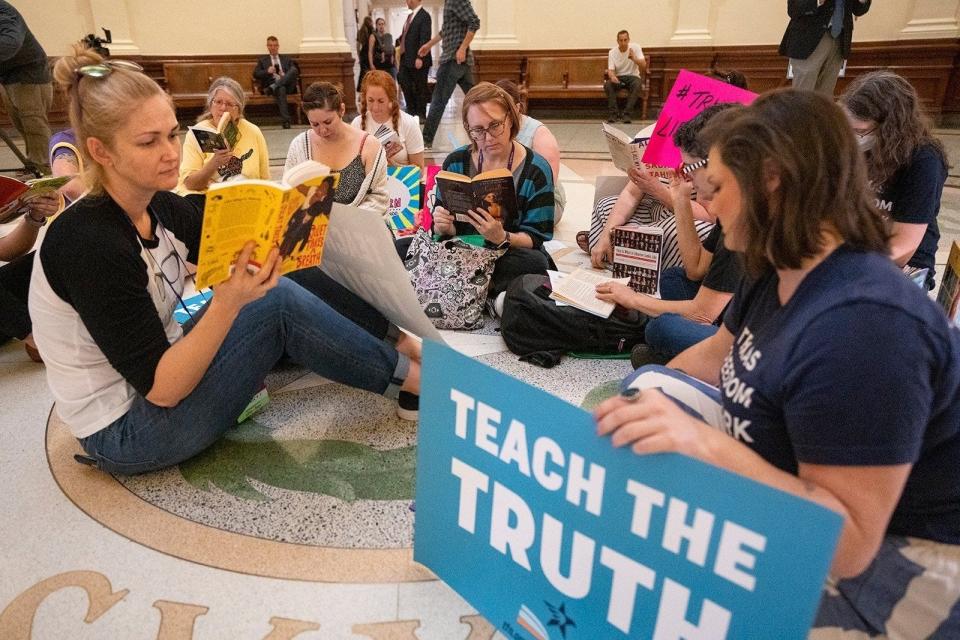Opinion: Students and the right to read – why new law should be challenged
One of the most troubling bills passed by the Texas Legislature in the 88th Regular Session is House Bill 900, dubbed the “READER Act.” Signed into law by Gov. Abbott on June 13, HB 900 will undoubtedly result in the exclusion of thousands of books from school libraries.
The bill should be challenged in court on First Amendment grounds. Who has standing to do so? Parents, students, and, especially, anyone who sells books to schools in Texas, including publishers, book distributors, and bookstores.
This law requires that any vendor, publisher, or bookstore that sells books to Texas schools apply labels warning of sexual content. Schools will be prohibited from purchasing any book labeled “sexually explicit,” a new category of harmful material created by this bill. If HB 900 only limited student access to harmful material, it would be less problematic. However, the new law casts a much wider net.

HB 900 stipulates that if the state finds that booksellers get the self-rating of even a single book wrong, they could be barred from doing business in Texas for a year. Therefore, the incentive is powerful to err on the side of caution and overrate books as to sexual content. This will result in many books being eliminated from school collections that are entirely appropriate for student use.
HB 900 is part of a national campaign of book banning. These efforts claim to address pornography in libraries, however, PEN America, which tracks book bans, has documented that over 26 percent of challenged titles in 2022 feature LGBTQ themes and 30 percent are about race, racism or feature characters of color.
Consider one example of many: the critically acclaimed middle-grade novel Out of Darkness by Ashley Hope Pérez. Often cited by censors as “pornographic,” sexual content in this book consists of two or three paragraphs out of 400 pages. The book would not meet established obscenity tests. Nevertheless, a book vendor, considering the risk, may well label this book as “sexually explicit.” Once that label is attached, no student in any school in Texas will find that book in his or her school library. (For the record, the real subject of Out of Darkness is not sex, but systemic racism in East Texas in the 1930s, suggesting the real motive behind the push to censor this and many other titles.)
To restrict such books from school libraries is a violation of students’ First Amendment Rights. Rulings from the Supreme Court on cases such as Tinker v. Des Moines School District and Island Trees School District v. Pico have yielded protections for students’ constitutional rights and affirmed that they do not “shed their constitutional rights to freedom of speech or expression at the schoolhouse gate.” In the 1982 Pico case, the Supreme Court affirmed that “Our Constitution does not permit the official expression of ideas,” and that a school board acted unconstitutionally when books were removed from the public school library based upon their “personal values, morals and tastes.” We are not attorneys, but it seems that HB 900 will result in just this kind of unconstitutional limitation on public school library books. Two recent lawsuits have emerged against similar legislation in Arkansas and Florida in the cases of Fayetteville Public Library, et al. v. Crawford County, Arkansas, et al. and Pen American Center, Inc., et al. v. Escambia County School District and the Escambia County School Board, respectively.
Students have a right to read. Reading has been demonstrated to be a key factor in student success. This legislation will lead to content-based restrictions on constitutionally protected speech in school libraries. HB 900 is a bad law and should be opposed—and challenged in court—vigorously.
Leila Green Little lives in Llano and is a plaintiff in a suit challenging the removal of books from the Llano County Library System. Smith is the former State Librarian of Texas.
This article originally appeared on Austin American-Statesman: Opinion: Students have a right to read – why new law should be challenged

